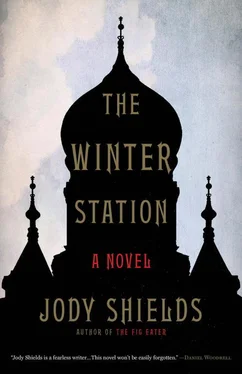Her face tilted up to him and the water in the silver bowl reflected the curve of her cheek and for a moment the two balanced shapes filled his eyes. An older woman might have whispered an intimacy, but Li Ju simply smiled, transparent, acknowledging his admiration.
As a very young girl, Li Ju had left a missionary orphanage to work as a servant in the Baron’s household. She accepted his care with a child’s straightforward happiness. She lived under his roof, slept on a small mat of wadded silk and cotton for years before they became lovers and shared the k’ang bed. When she became an adult, his expectation was the same. Nothing changed. The habit of days. He didn’t believe devotion was a debt owed to him for providing her with a home but he had become accustomed to her deference.
That night, he was jolted awake and sat up in bed. He was swept with shame. Two men had died violently and he had shaped it into a story about his own authority. His place in the world. “Mother of God,” he whispered and crossed himself.
But he was haunted by another image, dark and jagged. The dead Chinese could easily have been thrown in the Sungari River and their weight would have broken the still-thin ice, the thickness of two fingers. Then he wished that this had been done, that the bodies were in the river, and he imagined this as if he were drowning, looking up at the sky through the ice one last time, his eyes already liquid.
In the morning, the Baron and his wife lit a candle for the dead at St. Nikolas Cathedral on Central Square. Their hands cupped together around the warm candle and the flesh of their fingertips glowed translucent pink. His wife was not a believer but the ritual of contemplation was familiar to her. She tipped her head back and her face was suddenly hidden in the darkness. The building was an immense shadowy height above their heads, its bulb-shaped domes, the lukovichnye glavy, were compact as a hive, made with countless wood shingles overlapped against the Manchurian wind. The entire structure was built without a single nail, joined together with minute wooden pegs so that no pinpoints of reflected metal disturbed its dim interior. Perhaps its peaceful assembly, the lack of violent hammering, was an offering to God.
When Baron von Budberg had first arrived, Kharbin had no history. It was a camp. The first child had not yet been born. There had never been a wedding or a funeral. No eye had looked at the landscape through a curtained window. No shadow had been cast by a church tower. Kharbin was established in the Manchurian wilderness in 1898 by order of the czar, a Russian city built in China, an arrogant stake of empire.
A hereditary aristocrat, a Russian diplomat’s son, a doctor, the Baron traveled from St. Petersburg to Manchuria in 1904 to serve as a medic in the imperial army after the disastrous war with Japan. He worked, partially protected from heat and stinging blackflies, under a makeshift canvas tent. The pay was poor, the conditions primitive, the weather insufferable, and the silence absolute.
During his first year, the Baron learned to forget what made a city—the streets sealed with paving stones, vertical pressure of buildings, the shifting pattern of pedestrians and vehicles. He suffered a constant feeling of oppression from the flat land and the enormousness of the sky. There was an ocean overhead. Could a man’s bones splinter under the pressure of this weight?
The wind was a constant harsh presence, sweeping the scent of primeval forests down from the immense northern territory, the ancestral home of the Manchu rulers. In the summer, the wind was weighted with yellow sand that filled cracks in buildings, silted up windows and the railroad tracks.
* * *
Kitayskaya Street was impassable with vehicles stuck in the snow. The droshky stopped and the Baron and Andreev began to walk, their impatience slowed to caution as they stepped carefully, struggling for balance on the frozen surface. Andreev clutched his arm. The sidewalk in front of the luxurious dress shops, the corsetiere Louvre Atelier, the German store Kunst and Albers, had been swept to a glittering eggshell-thin layer of ice. Long thin spears of ice, yellow with embedded dirt and grit, barred the windows of Churin’s department store.
Something, a rough piece of ice, fell at their feet and Andreev glanced up at the windows. “See? The sand never leaves us. Frozen into the ice. Then it melts. Then it blows back at us in the summer. There’s either sand or snow in the air.”
“Mercifully, the snow only lasts for half the year.”
“More than six months. It slows down my import business.”
The Baron was amused by the seasonal nature of Andreev’s smuggling. “Yesterday I became lost on Mostovaya Street. So many new buildings had been constructed in two weeks that the place was unrecognizable.” He gestured at the saplings thickly wrapped in coarse fabric, barely visible above the snow. “Russian grandeur. They dream of transforming the street into the czar’s garden. It’s folly.”
The proprietor of the Volga restaurant lifted the Baron’s heavy coat from his shoulders and ushered the two men through the overheated space to a table in the back. The Baron sat down, wiped his damp face, waited until the cold air in his lungs was exchanged for the dense tobacco smoke in the restaurant. Andreev watched him silently. He looked as if he needed a shave, although it was just past noon.
“Early cold.” The Baron coughed.
“Reason enough to drink until the dwarf arrives.” Andreev had promised to introduce a friend of his, Chang Huai.
“A friend or a business friend?”
“Friend. He’s famous in the city. And deserves the acclaim. It’s cold work standing in front of Churin’s department store smiling at rich women.”
The warmth returned to their feet after half an hour in the restaurant. The Baron ordered zubrovka, vodka flavored with buffalo grass. He brought up the matter of the equipment ordered in July, two months ago, now certain to be held up by early snow in Hailar. He was expecting an examining table, optical equipment, Braun photographic apparatus, medicine, and sterilizing solutions from Berlin, everything destined for Kharbin’s hospital. Andreev had been paid to secure the shipment, since railroad employees routinely plundered crates during transportation, seldom bothering to cover up evidence of their tampering.
“Which month do you believe our shipment will arrive?”
“I never predict. But I’ll ask the stationmaster about the delay.”
“He always has an excuse. Possibly your bribe wasn’t generous enough.”
Andreev corrected himself. “I will pay the stationmaster to fix the delay.” He worked inside his circle of contacts to smooth transactions.
“If the train was overpacked, my crates were likely sacrificed to make room for cases of vodka.”
“Drink is more precious than medicine in this place. I once knew a missionary who successfully smuggled in vodka under Methodist Church literature. No one could bear to inspect his dull crates.”
How Andreev came to Kharbin was a mystery. One trader claimed he was a Russian army deserter. Another man, a Hungarian, swore Andreev was a mercenary who had sold exotic animals, Siberian tiger cubs and bears, at a market in Dairen on the Yellow Sea. His skin, weathered brown even in winter, contrasted with his eyes, the pale green of celadon. Andreev rarely spoke about the past but his hands were marked with scars. The Baron had recognized the slashes were originally bone-deep, perhaps made by an animal or a knife.
They’d known each other for years but even when eased by vodka, they rarely discussed anything personal, never shared a meal at the Baron’s table, although Andreev was frequently invited. How old are you? the Baron once asked, and Andreev, startled, blinked as if threatened and didn’t answer. The Baron wasn’t certain the man was literate.
Читать дальше











